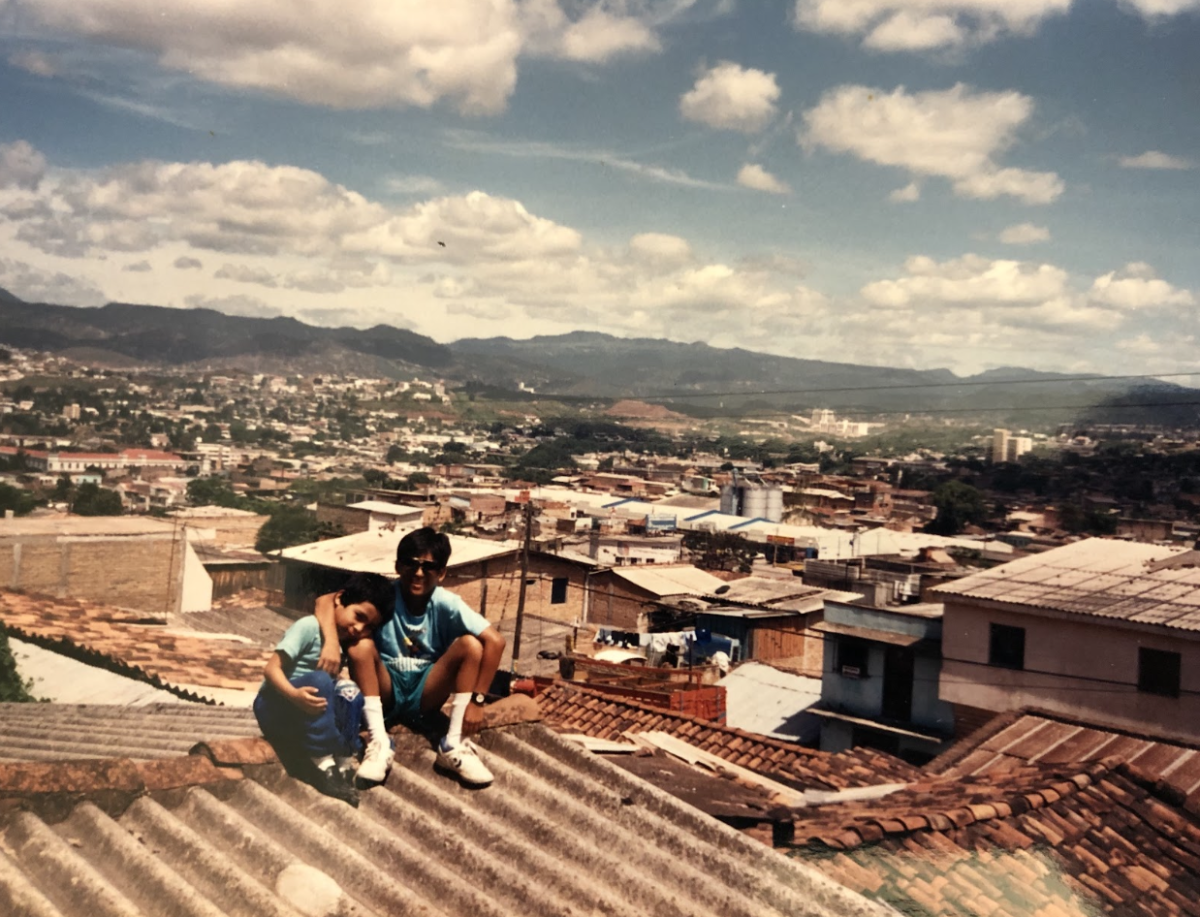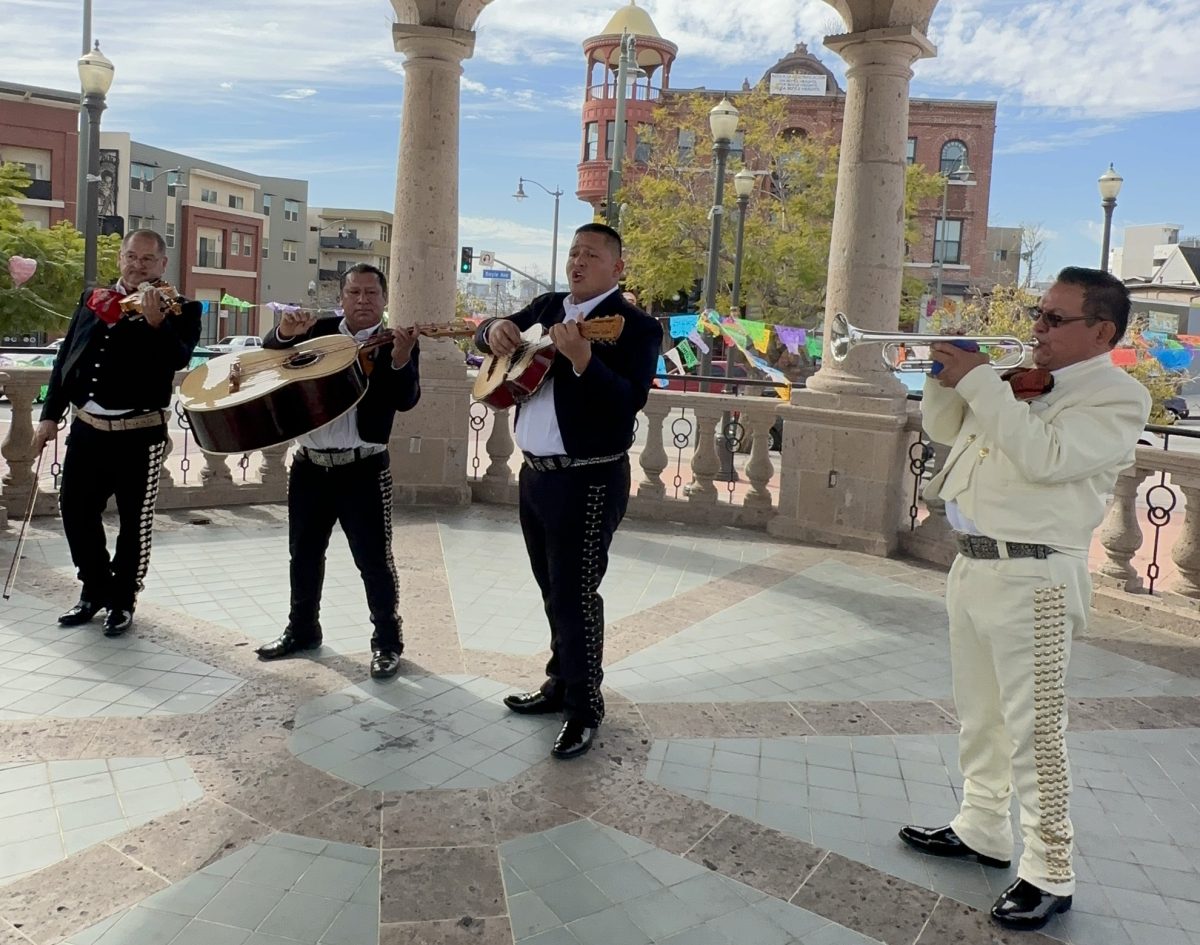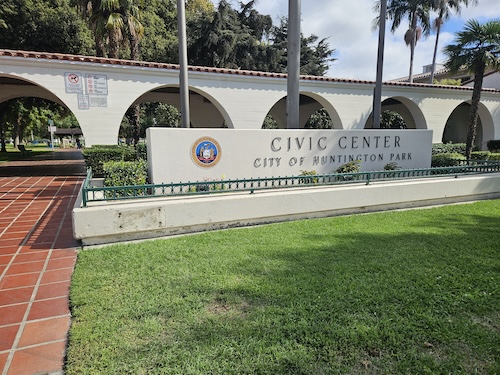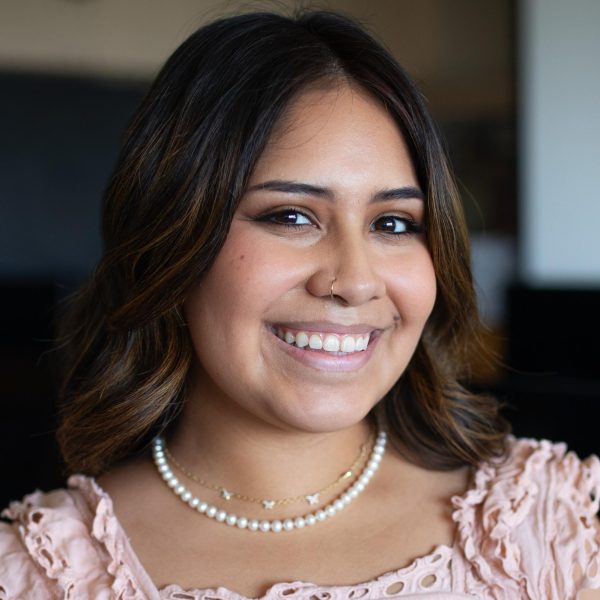“Don’t dream it, be it,” Luca Stapleton (she/they) said as she quoted,“The Rocky Horror Picture Show.”
From a young age, 19-year-old transgender actress Luca Stapleton knew who she was and who she wanted to be. She began exploring her gender expression at the age of 15 thanks to the movie “The Rocky Horror Picture Show,” and she never looked back.
Going through her transition at 17 during the pandemic brought challenges, but also gave her the privacy to move at her own pace and not worry about the outside world. She experienced turmoil while trying to find her footing, but Stapleton now feels comfortable in her body and in her identity as a transgender actress.
Stapleton is an actor, singer and writer located in Los Angeles,. Originally from Carlsbad, Stapleton now attends Cal State LA as a theatre major. She starred as Shakspeare, a lead character in the “Something Rotten!” performance at Cal State LA in mid-November.
This interview has been condensed and edited for clarity.
At what point in your life did you realize you may be trans?
“I always had little signs, you know, putting on mom’s clothes or whatever. And like, goofing around with that and wanting to dress up and wear makeup all the time, but I think I was around 14 when I started questioning [my gender], especially around the time when puberty really hit me hard. And I was like, ‘I don’t like noticing my body’ and [I was] not liking the specific way it looked. I was going into this fear of male aging or whatever. And that’s when I got inspired, like, ‘I’m gonna do it.’ When I was about 15 I went to go “The Rocky Horror Picture Show,” and heard the Frankfurter singing line, ‘Whatever happened to Fay Wray, that delicate satin-draped frame, as it clung to her thigh, how I started to cry ‘cause I wanted to be dressed just the same.’ I was like, shit, I do want to present and be seen so differently, and how I am and it was just that was like a pivotal turning point. I was like, you know, I’m going to do it. And that was around 15 when I figured it out, or at least admitted it to myself.”
So after you had admitted it to yourself, how long did it take you to come out to the people close to you, like your family and close friends?
“It was rather quick. Coming out to other queer people, some close friends like a boyfriend at the time, just people I was around. But it took a while before I was able to come out officially. I had to make a show of it because I am one flashy theatrical bitch. It was my sweet 16 birthday party, so I had a bunch of people over. I invited something like, I think maybe 60 people were there. And I had a couple of local punk bands come and play at my house, I was really into punk music. And I got up on stage and I sang almost the entire soundtrack of Hedwig and the Angry Inch, which is a musical about a very trans or genderqueer person. And I used this as a way to come out to everybody at that party that I am trans. And that was the moment. Since then I was like, yeah, that’s who I am. When I was officially out, from there it was like, ‘OK, I should begin this process.’”
Was this a beautiful moment for you and the people in your life?
“I think it was. I think a lot of them are like ‘Yeah, this makes sense for Luca.’ Not just being trans, but that I would have 50 something people over and perform my coming out like that. There’s nothing more over the top and camp than that, and it was certainly my moment. So I mean, I hope, I think some people were very proud. Other people were like, ‘It’s just Luca being Luca.’”
What were some hardships involved in the transition?
“It brought a lot of hardships right off the bat. I had already been bullied a lot. And this was just another weapon in people’s arsenal against me, but I refuse to let it faze me. But it was also rough because coming out could be a triumphant moment, but then you have to think about, not just the way that people are going to see you, but now the process of transitioning. Specifically, my parents wanted me to transition socially before I transitioned medically, to give it time to make sure it’s not a phase…This is one that didn’t happen to be a phase, but I do jump from phase to phase rather quickly… After that, the new hardship was trying to take control of my body. I was scared of this ‘puberty thing’ beginning to show. So it led to me developing a lot of problems like obsessive shaving as well as anorexia, and both of those things were very, very rough and especially during that time of early youth.”
During that time in your life when you said you felt you had no control over your body, what gave you a sense of control?
“It was particularly rough, because it was during quarantine. So the things that would usually ground me and give me a sense of control, purpose, like musical theater, even school, I really didn’t have because we were locked inside. So the only coping mechanism I really had was disordered eating. I got really into anorexia and didn’t recover until around the time I was able to start medically transitioning when I had just turned 17. Once I was able to start with my transition around that time, the tail end of quarantine in my junior year, it was like… I felt like I could relax. And transitioning earlier probably would have saved some hardship but I’m glad that I got it as soon as I did. I’m happy with how things turned out, but the thing that gave me that sense of control really didn’t happen until then. Once I got on estrogen that problem mostly went away. It’s still there, but it’s something that I’ve been able to mostly recover from and move forward with. Now I have a healthier relationship with my body. Not just with my gender, but with expression, with everything. Starting to transition medically really did do wonders for me.
That’s super great that you were able to find a better sense of control after quarantine and that you’re doing better now. Were there any silver linings involved with transitioning during a pandemic?
“It’s a double edged sword, because I feel like it gave me a chance to get a lot of stuff done, a very awkward part of my transition, out of the public eye. That was one interesting thing… because by the time I came back to school and senior year after quarantine, I had already been on estrogen for like six months and was very much looking the way I do now. I was now presenting far more feminine: I learned how to do my makeup, I learned how to dress, how best to be me. And so coming into that senior year, some people didn’t even recognize me. And it was this kind of experience of like, ‘Yeah, I’m different. This time has changed me and whatever you guys had thought of me. You can’t think that now because now I am an entirely new person.’ They could form a new perception of me, not entirely new of course. It was definitely almost a power trip coming back and being like ‘Look how hot I am now.’”
So you mentioned earlier that one thing that helps you feel in control is musical theater, but obviously we couldn’t do that during COVID, because in musical theater we’re constantly singing in front of people, around tons of people in close proximity, it’s just not an option during COVID. Now that we’re mostly out of the pandemic, how has theater impacted your identity as a trans person?
“I feel very in line with my view of gender and expression, and it’s not exactly everybody’s view. The way I view my own gender is in a performative sense. I think it was Judith Butler that talked about gender performativity, but I very much see gender and expression and the performance of gender roles. I see it as theater. I say, ‘I don’t like the way I’m being viewed by the audience. The world around me is viewing me so I’m gonna change it. I’m gonna change how I’m performing.’ Musical theater gave me an outlet to express these very overwhelming feelings of gender, these means of expression. I was raised in the theater. I was raised by my mom who has been a drama teacher for 25 years. So theater was always the thing I saw the world through, so getting to do theater has been something that has been really, really amazing for my expression. I also had to grapple with, well, I’m still going to be cast in these tenor male roles when it comes to musical theater. And that was something like, how do I separate it? And the way I view it, it’s drag. I see it as performing that masculinity on stage. I had so much fun with it, I didn’t let it get me down. So for me, musical theater has served as both this way to express myself and embody the larger than life characters that I feel connected to as well as this thing that’s taught me how to deal with these moments of dysphoria, because if I were to just say, ‘No, I’m only taking female roles in musicals,’ it would really limit what I’m able to do because there’s very few female roles that are tenors. So instead I say, you know what, I’m gonna play anything and everything.” What you said literally is mind altering for me, about your comments regarding how theater is also a performance but our gender expression is a daily performance that we’re putting on. I know you touched on some vocal challenges during musicals and how straight plays can be better for dysphoria. But my last question for you is, are there other challenges that you think you’ve been presented with as a trans actress?
“Yeah, absolutely. So for me there’s always typecasting. And the strangest thing is I think that actors have a very unique awareness of ourselves, when you know what role you’re put into, when you get put into the same thing over and over and over again, you know people perceive you as this. It’s this thing that plays in tandem with trans-ness, and trans people also very much are very hyper-aware of the way others are perceiving them, oftentimes to a point of fault because their own dysphoria is telling them oh, people must perceive me this way. The obstacle is trying to grasp what is the new typecast and how can I fit into something I hadn’t before? There’s only so many Headwigs and so many Franken Furters. There is a lack of trans characters in musical theater, or alternatively female characters that I can play in musical theater. I’m very proud of being trans. I’m very openly trans and an openly queer, but sometimes I don’t want every stranger to know who I am. Especially right now in our political climate with the reactions that can happen. They can be very negative. Another thing that I think has been an obstacle is me not correcting people, because when I’m playing a male part I’ll get misgendered a lot. There’s always this thing that’s like, you know, do they mean Luca or the character? It’s not something that bothers me as much. The further along I get in my transition, the less that pronouns bother me. The more that the internal begins to feel like it makes sense, the more confidently I can show up exactly the way I am. And the more I don’t care if you call me this pronoun, or this pronoun, I know who I am. No matter what I’m wearing, no matter what I am in a given moment, no matter what I feel in a given moment, on a given day, I am always this thing that is in flux. This thing that can defy what the cisgender, hetero-normative society wants me to be. And it’s something I’m so proud of. I’m glad to be a Frankenfurter. I don’t feel any need to feel shame for it. And I think that all these things that I’ve experienced, be it mental illness, disordered eating, musical theater, all these things are all part of patchworks. They are all these little parts of the Frankenstein monster that is me all sewn up. And I’m just glad to be that. And I wouldn’t give it up for the world. I’m happy to be me. And I’m also happy to always be able to articulate this to others and to talk to people like you. Just thank you. And don’t dream it, be it.”
Editor’s note: The reporter on this story is a theatre minor and was a part of the “Something Rotten!” production on campus.




